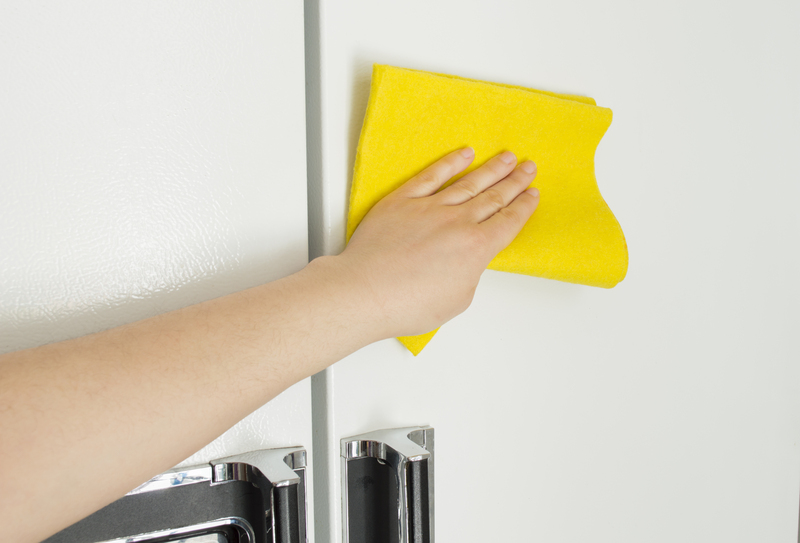Nurture a Healthy Home by Eradicating Pet Odors
Posted on 29/08/2025
Nurture a Healthy Home by Eradicating Pet Odors
Our pets are beloved members of the family, but the odors they sometimes leave behind can be less than welcome. Whether you're dealing with the lingering scent of dog fur, cat litter, or the occasional accident, knowing how to banish these smells is essential to maintaining a healthy, fresh home. In this comprehensive guide, we'll explore thorough, practical, and science-backed strategies to eliminate pet odors--helping you nurture a home environment that's not only sparkling clean, but also safe and comfortable for every family member--two or four-legged.
Why Addressing Pet Odors is Crucial for a Healthy Home
Eradicating pet odors is about more than just pleasant smells--it's a vital part of maintaining indoor air quality, safeguarding your family's health, and preventing long-term damage to your home's furnishings. Persistent odors can indicate underlying hygiene issues, the growth of bacteria, or even hidden pet accidents that can result in stains and deteriorated surfaces. Tackling these odors proactively strengthens the health and well-being of your household.
- Improved Air Quality: Odors often carry microorganisms and allergens that can affect respiratory health.
- Prevents Bacteria Growth: Hidden pet waste can harbor bacteria and mold.
- Protects Furnishings: Odor molecules can seep into carpets, upholstery and even walls, causing lingering issues.

Understanding the Source of Pet Odors
To effectively eliminate pet odors at their root, it's important to first understand where they originate.
1. Pee and Poop Accidents
Even the best-trained pets sometimes have accidents. Urine and fecal matter are not only smelly, but they also contain enzymes and bacteria that contribute to stubborn, recurring odors.
2. Fur, Dander, and Saliva
Shedding fur, dander, and even drool can cling to surfaces, contributing to a musty and persistent "pet smell."
3. Litter Boxes and Bedding
Your pet's eating and sleeping areas, especially cat litter boxes or unwashed bedding, are hotspots for odors if not cleaned regularly.
4. Body Odor and Skin Oils
Just like humans, pets produce natural oils which, if not routinely managed with grooming, can accumulate on furniture, rugs, and your pet's favorite resting spots.
Step-by-Step Guide: How to Get Rid of Pet Odors and Keep a Healthy Home
1. Locate and Address the Source Immediately
- Inspect Often: Find hidden accidents using a UV blacklight to detect urine spots on carpets and furniture.
- Act Fast: The quicker you address spills or biological matter, the easier it is to prevent lasting odors or stains.
2. Enzyme-Based Cleaners: Your Best Friend Against Pet Odors
Enzyme cleaners are specifically formulated to break down the proteins and organic molecules responsible for pet odors. They are especially effective for urine odors, penetrating deep into carpeting, upholstery, and other absorbent surfaces.
- Choose a high-quality, pet-safe enzyme cleaner for carpets, rugs, fabrics, and hard floors.
- Always perform a spot test to avoid discoloration.
- Follow instructions for full dwell time so the enzymes can work effectively.
3. Deep Clean Soft Surfaces
- Vacuum Furniture and Carpets: Use a vacuum with a HEPA filter to capture fine hair and dander.
- Wash Bedding and Blankets Weekly: Hot water cleans and disinfects.
- Launder removable cushion covers regularly.
4. Hard Surface Cleaning Methods
- Sweep and Mop Hard Floors: Use diluted, pet-safe cleaners or white vinegar for natural odor removal.
- Clean baseboards and walls where pets may rub, drool, or shed fur.
5. Deodorize the Air and Hard-to-Clean Areas
- Set up baking soda bowls in problem zones to absorb lingering smells.
- Use air purifiers with HEPA and activated carbon filters to trap odor molecules and allergens.
- Open windows regularly to ventilate and refresh indoor air.
6. Regular Pet Grooming
- Brush your pet daily to remove loose fur and reduce dander.
- Schedule regular baths (with vet-approved shampoos) tailored to your pet's breed and coat type.
- Wipe paws and fur before pets come inside to prevent dirt and odor buildup.
7. Maintain Litter Boxes and Pet Areas
- Clean litter boxes at least once a day. Replace litter fully and wash the box weekly using soap and water.
- Freshen pet beds and crates by vacuuming and disinfecting.
- Use odor-absorbing pads or liners.
8. Specialized Solutions for Persistent Smells
- Consider professional deep cleaning or carpet-steaming for chronic odor problems.
- Use ozone machines or deodorizers (ensure your pets are safely out of the area during the process).
Natural Remedies to Remove Pet Odors
If you prefer non-chemical, eco-friendly approaches, nature offers several options for naturally eradicating pet smells from your home:
- Baking Soda: Sprinkle on fabrics, let sit, then vacuum.
- White Vinegar: Mix 1:1 with water to neutralize odors and clean hard surfaces.
- Activated Charcoal: Naturally absorbs odors from enclosed spaces.
- Lemon Juice: Freshens carpets and leaves a clean scent. Spot-test first for colorfastness.
- Essential Oils: Use pet-safe types (like lavender) in diffusers for gentle, pleasant scents.
Important: Always research whether your chosen essential oil or natural remedy is safe for your specific pet, as some substances (like tea tree oil and certain plants) can be toxic to animals.
Preventing Pet Odors: Long-Term Healthy Home Strategies
Consistent Routines for Odor-Busting Success
- Establish a Daily Cleaning Schedule: Just 10-15 minutes a day can prevent buildup.
- Designate Pet-Free Zones: Limiting where pets roam can keep main living spaces fresher.
- Train pets to wipe paws or use mats at entryways.
Special Considerations for Multi-Pet Homes
- Use multiple litter boxes and beds to prevent overcrowding and accidents.
- Monitor pets for any change in bathroom habits--could signal a health issue causing unusual odors.
Health Benefits of a Fresh, Odor-Free Home
A home that's free from lingering animal odors doesn't just smell better--it feels healthier:
- Reduces allergen exposure for sensitive individuals.
- Decreases risk of mold and bacterial growth in hidden spots.
- Supports emotional well-being, as a clean-smelling home is calming and inviting.
Common Mistakes When Trying to Eradicate Pet Odors
- Masking, Not Eliminating: Air fresheners only cover up smells rather than address the root cause.
- Overusing Harsh Chemicals: Can be dangerous for pets and children--opt for pet-safe, environmentally friendly products.
- Inconsistent Cleaning: Letting chores pile up makes it harder to remove established odors.
- Ignoring Ventilation: Fresh air is one of your best allies in removing lingering pet smells.
When to Seek Professional Help
If you've tried multiple methods and still can't get rid of stubborn pet odors, it may be time to call in the experts:
- Professional carpet, upholstery, or air duct cleaning services can reach deeply embedded odors.
- Persistent smells could indicate hidden water or mold damage, requiring a trained inspection.
- If odors are linked to unexplained pet accidents or health changes, contact your veterinarian.
Best Products and Solutions to Eliminate Pet Smells
- Top-rated enzyme cleaners (Nature's Miracle, Simple Solution)
- Pet-safe air purifiers
- Odor-absorbing gels and sprays designed specifically for pets
- Automatic vacuum robots for daily hair pickup
- Specialty pet laundry detergents
Frequently Asked Questions About Removing Pet Odors
How often should I clean my pet's bedding?
Ideally, wash pet beds, linens, and crate pads at least once a week. For pets with allergies or heavy shedders, more frequent washing may be needed.
Can essential oils help eliminate pet smells?
Some essential oils can help, but make sure to use only pet-safe varieties and always in well-ventilated spaces. Cats and some dog breeds are particularly sensitive to many oils.
What's the best way to remove cat urine smell?
A good quality enzyme cleaner is your best bet. Avoid using ammonia, as it can actually intensify the smell and attract pets back to the same spot.

Conclusion: Creating a Fresh, Healthful Space for All
Nurturing a healthy home by eradicating pet odors is an investment that pays off in every aspect of your household's comfort, cleanliness, and overall well-being. By addressing the underlying causes, using the right tools and methods, and establishing consistent routines, you create an environment where both humans and pets can thrive.
Whether you're a first-time pet owner or a seasoned animal lover, applying these tips and strategies can help you achieve a fresh, odor-free living space--a sanctuary of health, happiness, and harmony.
Quick Checklist: How to Nurture a Healthy, Odor-Free Home
- Clean accidents immediately with enzyme cleaners
- Vacuum and wash fabrics and bedding regularly
- Maintain litter boxes and pet areas
- Groom your pets and keep up with baths
- Ventilate and use air-purifying solutions
- Adopt a daily cleaning routine
Begin today, and enjoy the nurturing environment of a truly clean and healthy home!




